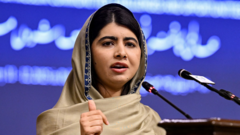Malala Yousafzai, the renowned educational activist and Nobel Peace Prize laureate, expressed her dismay at the Taliban's treatment of women during a recent summit focused on girls’ education in Pakistan. Speaking to a gathering of Muslim leaders and scholars, Yousafzai stated, “Simply put, the Taliban in Afghanistan do not see women as human beings.” She challenged the government's repressive approach, which includes banning female education and restricting women from participating in the workforce, arguing that such policies contradict the true essence of Islam.
Having survived an assassination attempt by the Pakistan Taliban in 2012 due to her advocacy for girls' education, Yousafzai's message carried significant weight at the summit hosted by the Organization of Islamic Cooperation (OIC). She labeled the Taliban's rule as a form of "gender apartheid," emphasizing the systematic punishment of women and girls who defy their oppressive regulations, often enforced through violence and intimidation.
Despite requests for a response from the Taliban regarding Yousafzai's comments, they remained silent. Historically, the Taliban has maintained that they uphold women's rights through their interpretation of Afghan culture and Islamic principles. However, their actions in power have faced significant backlash from the international community, especially since they took control of Afghanistan in 2021.
Currently, Afghanistan stands as the only nation globally where women and girls are outright prohibited from secondary and higher education—their right to education stripped from approximately 1.5 million girls since the Taliban’s resurgence. This alarming statistic continues to draw attention from global leaders and organizations, with calls for the Taliban to lift educational restrictions unheeded.
During the summit, Yousafzai underscored that the fight for girls' education is not confined to Afghanistan, gesturing towards a broader crisis that includes challenging situations in Gaza, Yemen, and Sudan. Yousafzai urged attendees to vocally denounce the significant violations of girls' rights, insisting that a unified response from Muslim leaders is imperative in confronting such humanitarian crises.
Her impassioned address served as a reminder of the ongoing struggles for women's rights and education, as she highlighted the monumental risks that girls face in conflict-affected zones around the world. Her presence at the summit marked her rare return to Pakistan, a homeland she had fled after her attack, emphasizing the resilient spirit of activists pursuing educational equality for all.
















